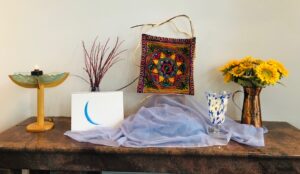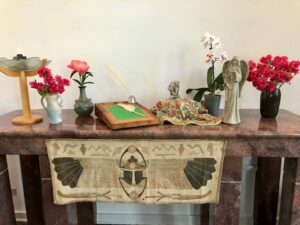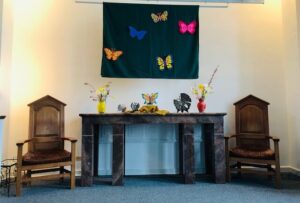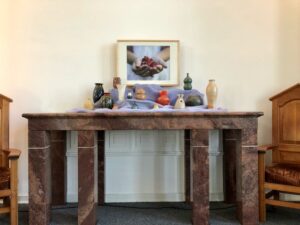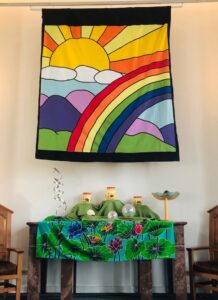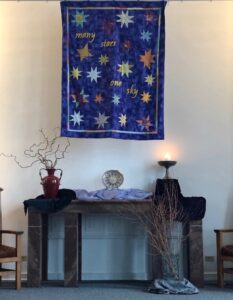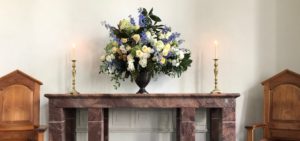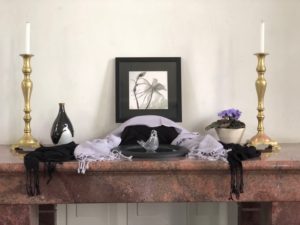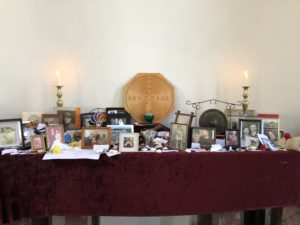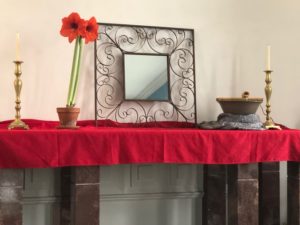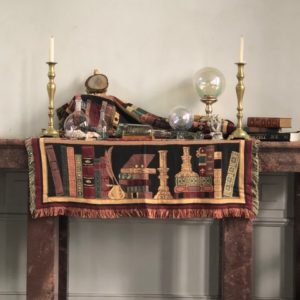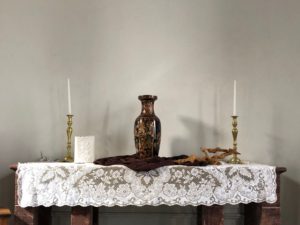Read the Order of Service
Thanks to Christine Gresser for brainstorming and reflecting together and contributing metaphors and phrases for this sermon.
THE ROAD MORE TRAVELLED
The poet Robert Frost wrote a poem called The Road Less Taken about a traveller who comes upon a fork in a road. The traveller considers options for a while, and then picks the path that is covered with more leaves, showing that fewer people have travelled that way. The poem ends by saying, “I took the road less travelled, and that has made all the difference.”
Often in our society, that is an ideal to which people aspire.
Why would we want to take the road less travelled? We may want to take the road less travelled because it leads to adventure, because it feeds our soul, because we can change the world for better, because we are unique. Sometimes it can be good. It can lead to great things, like an unexpected marriage, a utopian society, great art.
But much of the time, we need to take the road more travelled.
TENSIONS
What I hear in many life stories, is that when two roads diverge in a wood, we often end up living with the tension of two very valued options. Often, we have physical needs such that we can’t take the spiritual high road. Or, we have emotional needs such that we can’t choose the path of physical security. I imagine you can think of a time in your life that you wanted to follow a passion, and had to figure out how to do that in the context of limitations and other commitments.
For example: a mother who chose to have kids, but sees her career options limited
For example: A father who is divorced and sees the cost of maintaining a home
For example: an artist who pursues a passion and knows it means their retirement planning is compromised
For example: an elderly person whose capacities are diminishing, and so for security reasons they give up some of the things they love
Another example is from the story of my life, in a recent chapter, when I felt a call to serve the UU congregation in Charleston, WV, and they asked me to be their ministerial candidate. This all happened very fast, under a new search process structure, which allows congregations who did not find a minister in the usual year-long search cycle, to put their name in the hat a second time to find a candidate. I, myself, had not been in the year long search process, and decided in late spring to consider the congregation in Charleston, and that was the only one I considered. But, what I discovered was that three weeks was not enough time for me to decide in my heart whether I was ready to change my home. And, so, while I was with them for their week of candidating, I ended up withdrawing my name from consideration. This was extraordinarily hard, because I had very good reasons for considering the change of ministry. These reasons included that I would be able to grow as a solo minister in a full time ministry, which many see as a natural move after having served here half time as an assistant minister for six years. But, while I was in Charleston, I realized in my fibers that I simply could not imagine changing my home. In short, I realized I wanted to choose domesticity over “career.”
During this discernment, which was often a struggle, in those few short weeks, I asked again and again for spiritual guidance. I asked my mentors, I asked the Higher Power as I understand it. In ministry, we listen for a calling. I thought I was being called to blossom in Charleston. To my surprise, as the week passed, I heard a different voice, that the place for me to contribute right now is here in the community where I already am in the fabric. And yet, having ventured forth, I can not come back the same person. I need to make a new way here. In the coming year here at TJMC, I will be focusing more on supporting servant leaders; I will focus newly on listening to personal stories; I will contribute to refining our operating systems.
Now, this story is just one example of how one human navigated one passage. And chose the road more travelled, or perhaps the road less travelled. It depends on the perspective you take.
My friends, in this sermon on the Road More Travelled, I invite you to reflect on three lessons: that staying still can be okay; that time has sacred moments; and that we need to listen for the still small voice. These three lessons apply to our personal lives, our congregational life, our country, and our world.
LESSON ONE: STAYING STILL IS OKAY
In the book Oh the Places You’ll Go, by Dr. Suess, he names the many places the journey of life can take you. And one of them that he names is “the waiting place.” Here is what he says…
Excerpt about “the waiting place…”
He goes on to write…”That’s not for you, all that waiting and staying.”
But, my friends, I am going to take issue with Dr. Suess here. I don’t agree with him. Sometimes, in this life, in a well-examined, well-lived, spiritually whole life, I believe that choosing to wait and to stay can be a very valid option.
The metaphor of a river can apply to life because there are times when we are moving in the river of life, and times when our lives have stillness, like the little inlets at the edge of the river, where the water stays still a while. When things are not moving forward, we may assume they are not successful. When we experience times of stillness, the journey may seem stagnant, or boring. But these places of still water at the edge of the river is where reeds grow, and where wildlife drink. There is value in the still, waiting water.
Often, when a friend asks you how things are going, it is tempting to report what is going on, whereas if nothing is going on, we may be a little stymied. By some social norms, there are unwritten rules that careers are supposed to develop, families are supposed to grow, kids are supposed to go off to school, retirement is supposed to lead to new adventure. But a lot of times in life, that is not what happens.
I heard of a woman who had an answer to the greeting “What’s new?” She would reply: “Nothing is new and everything is old and that is a very good thing.” In her life, that meant that her marriage of thirty years, her house of twenty years, her job of twenty-five years were okay. She wasn’t needing to stir things up just because we are the land of opportunity and because everyone else on facebook seems to have a brand new life.
This leads to…LESSON TWO KAIROS AND CHRONOS
Sometimes life is like the river that seems to take forever to flow, and sometimes life is like a river where all the flows come together at once. The ancient Greeks knew this truth, and so they had two words for time.
Kairos (καιρός) is an ancient Greek word meaning the right or opportune moment. Chronos refers to chronological or sequential time.
If you know that both of these types of time are true, you open up your options for how you live your life, and create freedom in considering whether or not you missed opportunities.
I read a spiritual blogpost this week in which the author asks: “Did I miss out on my chance to make a difference?” And here this morning, I imagine that many of us ask ourselves, did I miss out on my chance to make a difference? Well, this author goes on to answer his own question by exploring the difference between chronos time and kairos time. If you measure by chronos time, you measure by the earth circling the sun, by seasons, by days and nights, by minutes ticking on the clock. Have you missed your chance to make a difference? But another concept is kairos time. In kairos time, we are open to the mystery moments, to grace acting in our lives, to opportunities where everything that matters might come together in an instant. And so I ask you, now, my friends, what would it mean for you to be open to kairos time in your life right now? This is why I want to challenge Dr. Suess. Because sometimes that place of waiting and staying is exactly where we need to be.
The same lesson is seen in nature: There is a small, slow-growing plant called lichen. We often overlook it on rocks, walls, and trees because it is steady and simple. But lichen weathers the storms and has consistency. Another example of the value of staying still is a good beer or a good wine, given time to ferment. There is something that can happen in a pause that is not possible with speed.
Right now it is July. For those of you who live with a school year schedule, you are on a pause between cycles. You have a chance to reflect on what you will do differently, next time around, your calling for this academic year.
Right now it is July. The summer. In the gardens and farms, we see that some things that were planted in the spring are coming to fruition. They will be harvested in the fall, and perhaps frozen or canned for eating in the winter.
On the cover of your order of service is a lotus. It grows out of the mud. It stays put, and it takes a while to blossom. It is a beautiful, serene flower.
The waiting is not a loss. It is a gain of clarity and right relationship. Limbo is a potentially positive thing if we wait with faith. But this is not always easy. It takes grace and courage to sit still. It takes patience to wait while you exhale and before you inhale the new. But, not acting in a rush gives you freedom.
This leads to…LESSON THREE STILL SMALL VOICE
So, the reason I am talking about all this waiting and staying is because it leads to our opportunity to listen for the still small voice inside. Earlier, we sang the hymn…”voice still and small, deep inside all, I hear you call…”
Perhaps you hear that voice calling while you are sitting on the bus, or while you are awake in the night, or when you are about to make a huge decision and realize it is not the right one.
The reason it is called a small voice is because it is so easy to miss. The voices of society can be large and loud, and they say something like this: go to school, get married, have a career, have kids, live in a traditional house with a traditional income, deal with illness the way everyone else does, and die without talking much about your dying process. Even trickier than the large, loud voices of society, are the voices of the liberal community. If you have chosen an alternative lifestyle, or if you are in a minority group, you have some ideal, or some allegiance, or some extra challenge to live up to. So, the still, small voice inside has to shout even louder. For example, is it really okay to be a woman and to choose to be a housewife? Is it really okay to be gay and to choose to be Christian? I lift up these examples because our best intentions sometimes squelch the still, small voice inside. What is the truest, deepest calling?
Here, the application of compassion really helps. If we offer ourselves, and others, deep compassion, we can feel where the love is guiding us.
APPLYING THE THREE LESSONS
WAITING AS APPLIED TO RELATIONSHIPS
So far in this sermon I’ve told you about ways that waiting might be a gift in your personal life. But what about in relationships? What about when your boss is taking the time they need to see you perform before giving a raise? What about the maturing your teenager is doing, that is beyond your timeline? What about the insights your spouse is gaining that can’t be rushed by your nudging? We would be unwise to try to harvest something before it is ripe. Can you be patient as the other person, shall we say, ripens?
Let time be your ally. It may feel unbearable to wait sometimes, but it may lead to right action.
To use the metaphor of the river—if two or more people are like the leaves in the river, and they want to float down the river together, they best wait in the inlet together, instead of one entering the rushing flow and be separated from the others.
So, what I’ve been talking about so far is the river of life, contrasting the times when we are flowing fast with the current, and other times, when we are waiting, and still, inactive. Both can be valuable. Both can apply in our personal lives—intimate relationships, workplaces, neighborhoods. And now I ask you to consider the same truth in our wider society and world.
APPLICATION TO CURRENT POLITICAL CLIMATE
One New York Times newspaper writer called this the week from hell.
We are in the heat of midsummer here in Virginia, and we are in the heat of world events—Zika virus, ISIS attacks during Ramadan, shootings in Louisiana, Minnesota, Dallas. Passions have been flaring in every sense of the word.
This week I have been reading a book by an African American preacher from Chicago named Otis Moss III. His book is entitled Blue Note Preaching in a Post-Soul World. The subtitle is: Finding Hope in an Age of Despair. He says that we need to resist letting the darkness find its way into us, and instead, learn to dance in the dark.
Dance in the dark.
Are you ready for that?
Are you already doing it?
This kind of comfort with the dark reminds me of an experience I had recently in a coal mine. Perhaps some of you have toured a coal mine, or worked in a coal mine, or been in a cave where no natural light comes in. The tour guide told us, “I’m going to turn the lights out now. And you don’t have to close your eyes.” I found this a spiritual metaphor. How often do we fear the darkness and squinch our eyes closed, using up our energy in resistance? Instead, what I did that day in the coal mine was relax. I kept my eyes open. And it was total darkness. And I was okay. I did not need to hunker down and protect against the darkness. And neither do we as a society.
My friends, right now, we may not be able to see the light at the end of the tunnel.
Yes, we may feel in utter darkness. But let us not strain or struggle with wasted energy. Let us relax into our strength and trust. The darkness can stay outside of us and we can keep the faith. Our culture has been corroded, gradually, and it will take time, gradually, to mend. We must not fall into separate camps. We must be vigilantly inclusive, looking for the humanity in ourselves and each person we meet. One of my mentors, in Tennessee, never pays for gas at the pump, because that is a missed opportunity to interact with someone in the community. Instead, he takes the extra time to go into the gas station, say hi to the gas station attendant, and see what conversation and bridge building can unfold. My friends, in the week ahead, look for every opportunity to say hello to someone. Look for every opportunity to build a bridge. You may be surprised where you find allies, or new perspectives.
Let this be the summer in which we cool our tempers and build bridges, instead of fanning the flames.
You may say I am naïve to have hope. You may say we are past hope. But I will tell you why I have hope. I will tell you that I see people aching, but not lost in the ache. I heard the call from Kate Fraleigh this past Friday—she said, I am home alone crying about this news, and I want to be with other people. So, she got organized and we had a gathering this Friday at church. Do you know why I have hope? Because I saw Jen Larimer take her lunch break from a busy work day and come to the church to be with other people. Do you know why I have hope? Because I read the words of a Dallas police officer who says we must continue to show up and build trust with each other. Do you know why I have hope? Because I know people who are teaching the next generation how to understand legal systems, how to organize for peaceful change. Why do I have hope? Because a church member pointed out to me this week that I could have showed up better as a minister this week if I had reached out and called up the church members who have black family members. My friends, I believe there is no choice. Our full humanity calls us to get up, no matter how tired, and look and listen for how we can be part of the solution.
In time, the right action will show itself. For you, the right action may be different than the person sitting in the pew next to you. Your friend may say, “Why be stressed? There is nothing you can do.” But that is your friend’s story. You need to stand up for your own story. Stand up for your own story and your own timing. When you know what you are being called to do, reach out, step out, call out, and do it. Love will guide us.
Amen. Blessed be.

